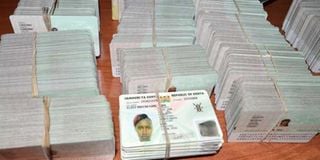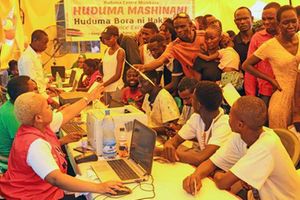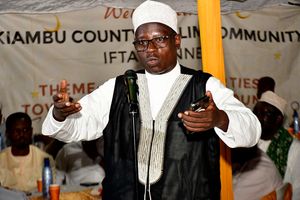
Uncollected ID cards.
Agnes Sianoi, 39, has lived as a Kenyan citizen without an identity card. She is a mother of five and her eldest son, who turns 19 in September, also has neither an ID nor a birth certificate.
Sianoi says she has tried to register for a national identity card before, but her efforts have been in vain because the services are far away from the Ndonyo Wasin area in Samburu East.
Despite being born, married and living in Samburu all her life, she has never had an ID card to access government services.
"I have tried several times to get an ID card, but the services are offered far away from where we live. The process is also long and complicated," she says.
Without the documents, she cannot even open a bank account for her savings or register a SIM card for her mobile phone.
Samson Lekasakei, a resident of Sereolipi, has lived without an identity card or birth certificate for more than three decades. The 31-year-old has spent his entire life herding cattle in the vast grazing lands of Samburu East, Koom and Uaso, and it has been a hardship for him to travel several kilometres to obtain these vital documents.
Marginalised
Mr Lekasakei and several other herders in the vast Samburu East region also lack identity cards, which means they frequently miss out on government services, making life difficult for them.
"We feel marginalised. It is not easy to travel several kilometres to get a national identity card. It is as expensive as you can imagine," said Mr Lekasakei.
In the vast, arid expanses of Samburu County, a silent crisis is gripping pastoral communities. For many, the lack of a national identity card casts a long shadow over their lives, denying them access to basic rights and opportunities.
Among Samburu pastoralists, it is common to find people well into their 40s who have never had a national ID card or birth certificate.
Samburu East MP Jackson Lentoijoni says the problem is deeply rooted in logistical and socio-economic challenges. He said thousands of people in his constituency often miss out on essential government services because they do not have national identity cards and birth certificates.
The MP added that the consequences of this crisis are far-reaching, affecting everything from voting to access to government services and economic opportunities.
"People have been deprived of essential government services and even their right to vote because they do not have national identity cards. Even children do not have birth certificates," the MP said.
"School-going children often miss out on school fees because their parents do not have national IDs," he added.
The process of obtaining a national ID in the country involves several steps, including the provision of birth certificates and proof of residence through verification. For many pastoralists, these requirements are difficult to meet, as some births often take place at home, away from health facilities where birth certificates are registered.
The challenges are compounded by the remote locations in which pastoralists live, which are often underserved by government services.
Travelling to registration centres is a daunting task, involving long journeys over treacherous terrain, according to Samburu Could Woman Representative Pauline Lenguris.
The lawmaker noted that locals, particularly women, often miss essential government services, including cash transfers, due to lack of national identification documents.
"Women have missed out on cash transfers meant to cushion them from the effects of drought," the MP said.
"The lack of formal identification makes it impossible for them to open bank accounts, get loans or engage in other financial transactions," she added.
According to Joseph Leorkupa, chief of Ndonyo Wasin Location, there are thousands of people living in the area without birth certificates and national identity cards.
"This is common and in my opinion, it is a crisis," he said.
USAID Nawiri initiative
But the locals are now relieved after they began the process of obtaining the vital documents for the first time in their lives, following a USAID Nawiri initiative to bring government services to remote areas.
Since Monday, USAID Nawiri has been organising the Huduma Mashinani Expo in parts of Samburu East to bring essential services, including the issuance of national identity cards and birth certificates, to underserved pastoralist communities.
USAID Nawiri Chief of Party Hussein Abdille explained that the Huduma Mashinani Expo is part of USAID Nawiri's broader efforts to build the resilience and well-being of pastoralists in Samburu County.
By facilitating access to these vital documents, the programme aims to address the long-standing challenges local people face in obtaining official identification documents, which are critical for accessing government services, voting, and securing employment.
The events, held in Sereolipi and Lolkuniani, saw hundreds of community members gather to take advantage of the services.
The Civil Registration Services were on hand to assist with the application process, ensuring that residents received their identity cards and birth certificates promptly.
Mr Abdille emphasised the importance of the initiative. "ID cards and birth certificates are more than just documents; they are gateways to a variety of opportunities and access to information," he said.
"Without them, the majority of local people are effectively excluded from the benefits of citizenship. Most of them do not have access to information on what breeds of animals to keep, and what certified seeds to grow, and there is a widespread lack of extension services. This expo is an important step towards inclusivity and equity.
Samburu Governor Lati Lelelit expressed his gratitude for USAID Nawiri initiatives to bring services to the people. The county chief highlighted the impact of the Expo.
"For years, our people have struggled to get these documents because of the remoteness of our communities and the lack of accessible services. USAID's Nawiri projects are bringing hope to our people," said Governor Lelelit, who urged the government to take outreach programmes to local villages to help people access these services.







